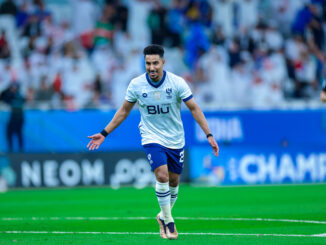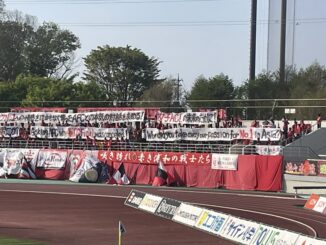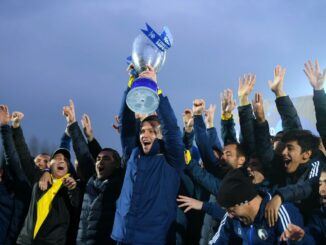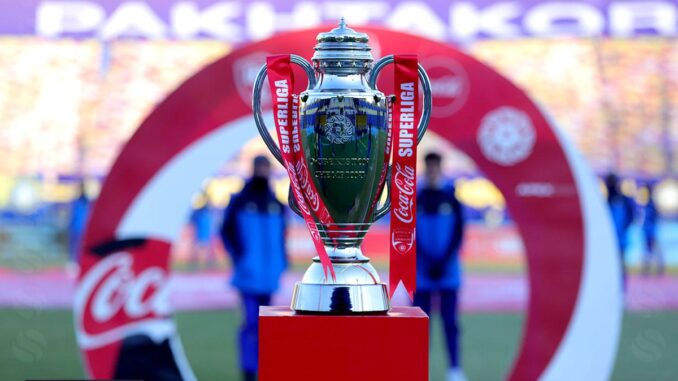
As the new Super League season resumes this weekend, Uzbek football is buoyant, generating increased interest inside and out of the country’s borders.
With renewed optimism placed on the new youth structures in place across Uzbekistan, following on from one of the most competitive title races on record, could this be the start of a positive future ahead for the continent’s sleeping giants?
The change in approach that led to growth
Positivity is infectious. So, in witnessing the opening of this month’s U20 Asian Cup in Tashkent it’s difficult not to get swept along by the swell of optimism enveloping Uzbek football currently.
Some 32,757 fans turned out to witness Uzbekistan open their tournament account with a 2-0 win over Syria on Wednesday. A staggering attendance considering the age group involved, at an otherwise low-key continental tournament that barely makes the sports pages across much of Asia.
Following on from a similar feeling at the U23 Asian Cup, held in the country last summer, in front of 30,000 fans once more, the AFC’s strategic forethought of focusing youth tournaments in developing host nations such as Uzbekistan, is already having a tangible impact on the local population’s enthusiasm around football.
While the AFC provided the stage for this recent realisation, it’s one small part of a wider collective of improvements instilled by the Uzbekistan Football Association (UFA) over the last five years that has turned around the national sport.
The planned reforms focused on moving away from the short-lived spending and last-ditch disappointments of yesteryear to a collective long-term vision to boost the domestic game from grassroots up.
Following their disappointing elimination in World Cup qualification for Russia in 2018, the UFA put their development into action; from improving infrastructure to a major rethink of youth development. A thorough professionalism boost was the jolt required to resurrect the country’s footballing system.
No individual club has embraced this change in approach more than Bunyodkor, the infamous name of Uzbek football’s big spending past that rose to prominence on the continental and international stage, with the capture of Rivaldo on the pitch, and Luis Felipe Scolari on the bench, making the AFC Champions League semi-finals in 2008 and 2012.
Nowadays, having predictably reversed their initial bank-busting investment, Bunydokor are now a solidly set mid-table team, with less focus on the short term, instead building for the future around a solid core of young players below 25 years of age, put into motion by former national team coach Vadhim Abramov.
While on paper, the club initially look to have gone backwards from their heady days of the early 2010s, in many ways the club is sustainably bedding down alongside an increasing maturity within the league as a whole.
Their current guise resembles the norm across the Super League, with clubs ranging from relegation threatened Surkhon, to title chasing Nasaf Qarshi, opting to build squads predominantly around young talent, under coaches that have the larger ecosystem of Uzbek youth development at the centre of their mind alongside their individual club’s achievements.
The wider purpose is to generate a larger pool of talented players, who accrue regular and consistent domestic minutes. Back in 2018, not dissimilar to any domestic league on the planet, Uzbekistan tended to see their best young talent hoarded by the dominant clubs at the top of the pyramid who, while developing their starlets alongside the best senior players in the country, in the main restricted their domestic minutes.
It wasn’t just the young players’ talent that was going unfulfilled either, the league’s image was being tarnished also, with a growing divide across the league becoming more apparent year-on-year. The top teams were dominant but lacked the necessary competition to really progress the league, while the chasing pack became risk-adverse, defensive and reactionary.
The landscape neither benefitted the top clubs, in preparing them for tougher assignments on the continent and on the international scene, nor the fans watching at home and in the stadium. Something needed to change.
Sacrificing dominance, for the greater good
Looking back, in each of my previous Uzbek season previews, since joining The Asian Game three years ago, I have asked, somewhat in hope more than expectation, the same question; can we have more competition at the top end of the Uzbek Super League?
With improvements in infrastructure and fairer deployment of youth talent, the playing field has finally heeded that call, with my often distant hope slowly becoming a realistic possibility, even if we haven’t yet seen a true break away from what can broadly be considered a domestic monopoly.
Pakhtakor are the certain elephant in this room’s conversation. The 15-time Uzbek title winners have become the outright dominant force in Uzbekistan over the past decade, winning, at times, as a result of a weak challenging pack behind them, rather than their outright quality.
However, from 2019, where they wielded a 20-point lead in the title race, to 12 and 13 points in 2020 & 2021 respectively, the gap was trimmed to a solitary point last term.
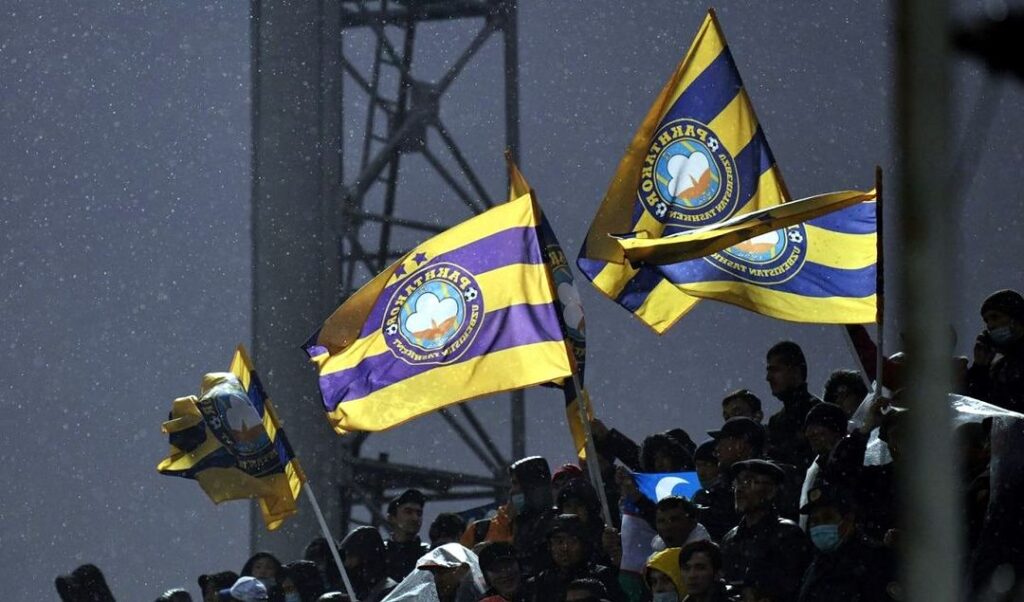
League reforms had a big part to play in that. Opposition, even from outside Tashkent – a rarity even a decade ago – through the likes of Navbahor Namangan and Nasaf Qarshi in the last year, were now able to pool resources, and compete not just on the field, but crucially off it, in the transfer market; either by bringing in comparable talent, demonstrated by Navbahor’s big cash investment at the start of last season, or in holding on to their own, in Nasaf’s case.
The most unique part of this reform, however, may be the formation of a youth national team in all but name, implanted into the domestic league structure.
Introduced in 2021, the UFA granted the inclusion of Olympic FC, where young national team prospects from various youth academies across Tashkent could be guaranteed first team domestic minutes, with as the name suggests an eye on building a competitive side that could qualify for the 2024 Olympic games in France.
Focusing on that particular generation, as a U20 side in 2021, the club under the tutelage of former Uzbek international Timur Kapadze won promotion immediately to the Uzbek top flight. Olympic went on to follow up promotion with a promising debut campaign in the USL, as in effect an U21 side, finishing sixth, a mere three wins away from a potential ACL qualification spot.
Their league finish only partly illustrates their successful impact; following up on a narrow quarter-final defeat in the cup to Pakhatkor the previous season, the young side secured back-to-back draws with their Tashkent neighbours last term.
All in all, a team devoid of any senior or overseas playing staff within their squad became a key contributor in the title race, losing only once, across six matches involving the top three last season.
The facility in which to build an identity, alongside meaningful competitive football has seen this age group flourish in their preparations for 2024; with a run to the U23 Asian Cup final (whilst entering as a U21 side) peaking somewhat ahead of schedule.
While there have been undoubted hiccups, namely their struggles away against more physical, and direct opponents at the other end of the table, the experiment can unequivocally be considered a worthy success.
While qualification for the Olympics next year is seen as the priority for this group, it’s not the solitary goal. In the last year, Olympic have developed and replenished their talent to reward those that have brought them success, with Ruslanbek Jiyanov joining Pari Nizhny Novgorod in Russia, Vladimir Nazarov moving to Neftchi and Pulatkhozha Kholdorkhonov, currently starring at the U20 Asian Cup, having returned to parent club Pakhtakor.
The key across all recent initiatives is the focus on collective gain. From infrastructure projects to greater media organisation, to strategic deployment of youth players, the league, the national team, and the players themselves all benefit from this concerted effort
Ahead of the newly expanded World Cup qualification cycle, the so-called bridesmaids of Asian football stand in a decent position to finally shrug off that moniker and put Uzbek football well and truly on the map.
Another tight title race ahead, but will we see a new name top the table?
Returning to the domestic product, in its form as a mode of entertainment, the Uzbek Super League has once again made strides in improving their offer, both to an internal and external audience.
The return to a weekend focused schedule, for example, which had previously been allocated midweek slots in hope that it could command larger television audiences outside the typically European dominated timeslots, should instead make it easier to attract the sort of crowds engaged at recent youth national tournaments.
The television offering has improved significantly year-on-year, while efforts to progress professionalism around the clubs, from improved training facilities, ensuring an adequate level of pitches, to a concerted effort to raise the standard of officiating and technology use, have all contributed to an all-round more appealing product that stands on its own two feet.
Another fiercely fought title fight would help its cause significantly and given the transfer business (or lack of it, in terms of outgoings) this off season, it promises to be another tightly fought fight for the Uzbek crown.
Arguably, this season is the first in a long while where Pakhtakor aren’t necessarily stand out favourites. Following Nasaf Qarshi’s run to the knockout stages of the Champions League earlier this year, and the key retention of much of their promising young talent, Akmal Mozgovoy and Alibek Davronov in particular, the exciting additions of Javokhir Sidikov and Mukhammadzhon Rakhimov add the type of flair regularly lost in their play last season.
The weakness may come in the finishing of those chances, after star striker Khysayin Norchaev left for Russia last month, the only real glaring deficit in Ruziqul Berdiev’s title chasing squad when compared to last season’s efforts.
Goals won’t be a difficulty, however, for Navbahor who, while holding back on the scales of spending seen this time last year, have still picked up the two most experienced Uzbek goalscorers of the last few years in Temurkhzhua Abdukholikov from Qizilqum, and Shokhruz Norkhonov from Sogdiana.
To supplement such experienced finishers, the return to Uzbekistan’s former golden child Oston Urunov from a once successful spell in Russia, looks like a career defining move for the lively playmaker, who’ll undoubtedly be keen on returning to the national team fold in the coming year.
Pakhtakor, however, chasing their sixth straight title, will once again boast the greatest strength in depth, despite probably lacking that little bit excitement.
The return of Sardor Rashidov from the Middle East, for the umpteenth time, will provide a reliable impact from out wide, at least until the summer comes when he’ll likely be tempted back. But without any other real standout incomings, reliance on Dragon Ceran, the league’s top scorer in the last four championship campaigns remains their key route to another title charge.
Considering how Olympic FC performed as an Under 21 team last term, some may suggest they could challenge the top three as an Under 22 side this year; especially as they welcome in the often frustrated domestically Jasurbek Jaloliddinov, who tends to find his best form under Kapadze’s leadership.
On the other side of the fence, the newly rebranded OGMK will aim to keep tabs with the title chasing pack with a much older profiled team, likely to be spearheaded by Spanish striker Ruben Sanchez, who was the league’s breakthrough player at the end of last season, having scored eight in his last 12 games for Surkhon.
At the other end, yo-yo clubs Andijon and Turon return after one year away from the top flight, the latter of whom confirmed relegation of former Tashkent powerhouses Lokomotiv in the end of season playoffs.
Bunyodkor, while playing some great football at times with some very exciting young talent in their squad, will be all too keenly aware of the potential slide of a former great, if the relegation dog-fight hots up as the season progresses.
As a developing league, the Uzbek Super League continues to offer intrigue, narrative and an abundance of quality young talent. With all working parts seemingly pointing in the same direction, 2023 looks like another positive year for Asia’s largest of sleeping giants.
Listen to the latest episode of The Asian Game Podcast


